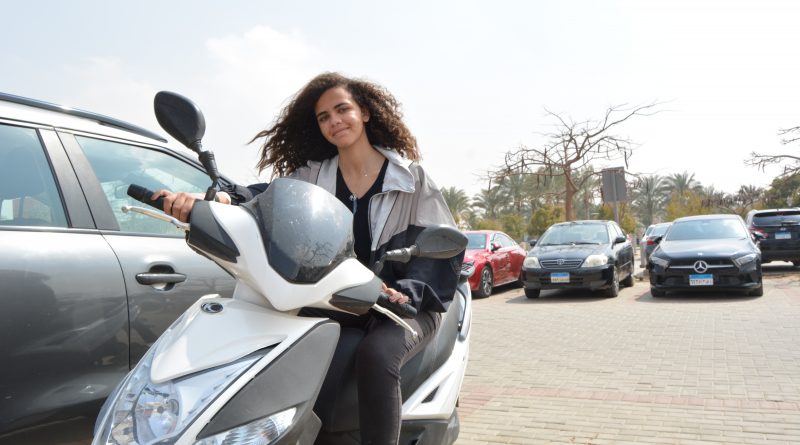Scooters are an Environmentally Safer Method of Transportation
Vereena Bishoy Boules
@vereena_bishoy
In an attempt to decrease their carbon footprint and avoid hectic traffic, members of the AUC community are now adopting more sustainable means of transportation.
The Carbon Footprint Report produced by AUC’s Office of Sustainability, which came out in April 2021, states that AUC’s transportation emissions increased by 4 percent from 2012 to 2020.
Tina Jaskolski, Sociology professor at AUC and Climate Security Analyst for the United Nations Development Programme (UNDP) Regional Hub in Amman, clarified how vehicle emissions increase air pollution.
“Scooters use less fuel than cars, so if a single person is traveling a shorter distance, they can be helpful in reducing CO2 emissions,” Jaskolski, who is also the creator of the Sustainable Campus Committee at AUC told The Caravan.
And they seem to be a hit with AUCians.
Malak Tamer, a Business Entrepreneurship sophomore, chose the scooter as a mode of transportation because he wants to feel that he did something to protect the environment.
“I chose the scooter, so when I grow old and reflect on my life, I want to feel like I did something different, I want to say that ‘I spent my uni years to the most’,” Tamer said.
For Biology sophomore Moustafa Sherif, it’s about what his research uncovered.
“Not just because I am a Biology major, but because I want to concentrate on conservation and preservation and doing a lot of research on sustainability, I know that the scooter is a sustainable choice,” he said.
Sherif and Tamer agreed that riding a scooter has many benefits, such as being cheap and convenient. However, they agreed that its biggest benefit is the parking ease it provides – especially at AUC where scooters, motorcycles, and bikes have their special parking lanes.
To encourage carpooling amongst students, AUC offers reduced parking fees for those who share rides.
Yet, with a scooter come many risks since they do not have a protective chassis, seat belt, or airbags. Scooter drivers may also find themselves susceptible to harassment.
“I was driving once, and an elderly woman pulled her window down and shouted ‘banat akher el zaman’ [Oh, the girls of this generation], and another man shouted, ‘la di el shoghlana lamet awy’ [So everything is for everyone now?/ Wet behind the ears] So if you are a sensitive person, this is not for you,” Tamer said.
Sustainable transportation options are not limited to just scooters – there are available options such as biking, public transport, or carpooling, with the latter being the most popular (and likely conservative) choice for many.
The Carbon Footprint report revealed that private car commuting accounts for 76 percent of emissions and 19 percent of overall emissions for the university’s transportation footprint. Carpooling would significantly alleviate that.
“Carpooling means that you can reduce the number of cars that are traveling, so instead of needing two or three cars, you just need one. This means that you can cut back on CO2 emissions, pollution, and the use of fossil fuels. You can also avoid traffic jams,” Jaskolski explained.
She further explained that years ago students at AUC designed a carpooling website and app which were discontinued shortly after because of high maintenance costs.
This idea was then revived by Amr Hesham, a Mechanical Engineering alumnus.
“Around 2012, if I am not mistaken, a carpooling initiative was launched, which I was really excited for, but it died out all of a sudden, and I do not know what happened exactly. I thought it would be a shame, so I decided to take on the initiative myself,” Hesham said.
He created a Facebook group which for all intents and purposes revived the idea of carpooling at AUC.
Hesham explained that the group was split into those offering rides and those wanting rides.
“As the community grew we created WhatsApp groups for each area, which you join through the Facebook group, which was the main hub,” Hesham told The Caravan.
In addition to reducing traffic and emissions, it is a great way to get to know people and create a community. He added that he made many new friends through the carpooling community.
Carpooling does have its benefits, but many have doubts about its degree of safety and practicality.
“Carpooling with friends and colleagues is not unsafer than using a car. Uber has actually done a lot to make us totally rethink transportation – we get into cars with total strangers because we trust the app. Perhaps similar apps could be developed for carpooling,” Jaskolski said.




